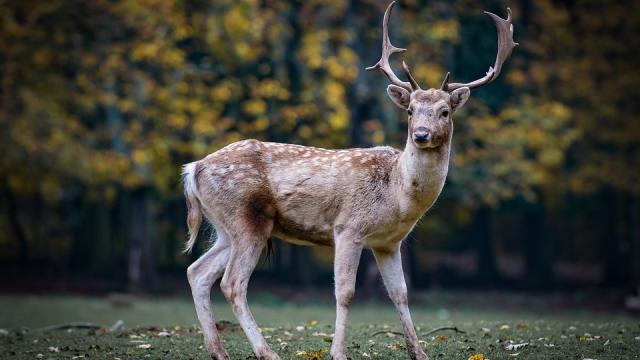Scientists’ worst fears over a so-called “zombie deer” prion disease currently spreading across the US and Canada are unlikely to come to pass, suggests a long-term study published this week in the Journal of Virology.
The fatal ailment, known as chronic wasting disease (CWD) and caused by a mysterious kind of protein called a prion, doesn’t seem capable of crossing the species barrier and spreading to humans – at least according to this experiment. Other research, however, has found otherwise.
Prions are one of the scariest ways to die, but we might be safe from catching one particular prion disease found in deer, a new study says. Photo: hashan (Pixabay)
Over a decade ago, researchers exposed macaque monkeys to brain matter taken from CWD-infected deer in one of two ways. They were either fed the tainted meat, or had it directly smeared onto their brains during surgery. The researchers then tracked the monkeys’ health up for 13 years, routinely testing them for the presence of prion disease. Once the monkeys reached the ages of 11 to 13, they euthanised them and studied their brains up close.
“After 13 years, no evidence for CWD transmission to macaques was detected clinically or using highly sensitive prion disease screening assays,” the authors of the study, which was funded by the US National Institutes of Health, wrote.
Since macaques have been used as one of the closest accurate models of human prion disease, it’s the most definitive bit of evidence to suggest deer-to-human transmission of CWD isn’t possible either.
Prions are an incredibly bizarre type of pathogen that are even further removed from the concept of life than viruses. They’re the misshapen form of proteins already abundant in the brain. But when a prion comes into contact with its healthy counterpart, it somehow forces the normal protein to become a copy of itself, sparking a chain of infection that over years, sometimes decades, hollows out the brain, causing it to resemble an overused sponge.
It can take a long time for this damage to become physically apparent, depending on the prion disease, but once dementia-like symptoms show up, it’s often only a matter of months before death follows.
Typically, prions either sprout up without explanation, are caused by genetic mutations that run in a family, or can be transmitted via close contact with infected brain matter (scientists are less sure about whether it’s only brain matter that’s a possible source). Prions affect a variety of mammals besides humans, including sheep, cats and cows.
Only one type of animal prion so far – the one responsible for bovine spongiform encephalopathy, or mad cow disease – is absolutely known to cross the species barrier. Throughout the 1990s, people who ate meat unknowingly contaminated with mad cow prions developed a unique form of Creutzfeldt-Jakob disease, the most common human prion disease.
The frightening cases prompted massive bans of possibly contaminated beef and a restructuring of the meat production process in many countries, which seemed to stop the outbreak from spreading further.
Scientists have known about chronic wasting disease since the 1960s. But in recent years, likely due to better awareness and an actual increase in its spread, cases have been spotted in more and more areas. Wild deer, elk and moose with CWD have been detected in 25 US states and two Canadian provinces, along with South Korea, Norway and Finland, according to the researchers.
Because deer, elk and moose meat is a common delicacy for many hunters and their communities, scientists have been worried about the potential next prion outbreak, one that might take decades to fully emerge.
Health agencies and specialty meat suppliers alike have begun to aggressively warn hunters against eating and selling meat from deer with symptoms of CWD, which include drooling, muscle weakness, and the titular wasting away down to almost nothing but bones. Some suppliers have even banned wild deer meat entirely from being used in their products.
But other suppliers have been defiant about the warnings, pointing to the lack of research showing the possibility of deer-to-human transmission.
Encouraging as the findings of this current study are, though, they’re unlikely to settle the debate just yet. As even the authors admit, another species of monkey they used in earlier studies did seem to easily contract prion disease from CWD-infected brain matter. And a Canadian study published last year, also using macaque monkeys, came to the opposite conclusion, finding that their monkeys became sick after either eating meat from CWD-infected deer or having prions injected into their brains directly.
For now, the findings will do little to nudge public health policy. The researchers still warn that people should avoid eating meat from deer that appear sick or thin, or are confirmed to have CWD.
